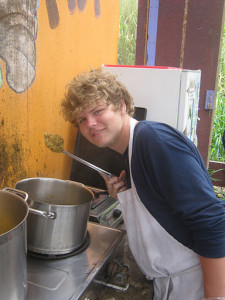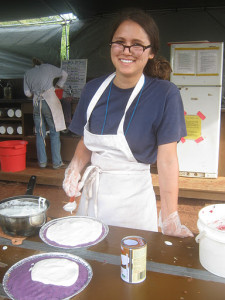By Dr. Jason Adams, Therapist
I think a good many of us know what Ohana means from the movie “Lilo & Stitch.”
Essentially, Ohana means family. Though I am Hawaiian and I often used the word
ohana growing up, the words of Lilo from that movie have always stuck with me.
“Ohana means family, family means no one gets left behind, or forgotten.” Many of
us also know that the Hawaiian word mahalo means thank you. At this time of year
during the holiday season, many of us are thinking of our families and that for which
we are grateful. This is part of the reason I enjoy this season so much, because
people seem to be focused more on both of these things – family and gratitude. The
same is true for the students and staff at Pacific Quest wilderness therapy program.
 Though many of the students feel a natural sense of sadness at not being home with their Ohana, they generally are able to feel a sense of connectedness to their temporary PQ Ohana comprised of the other students and staff that they live and interact with here. Family is important in the grand scheme of things with
Though many of the students feel a natural sense of sadness at not being home with their Ohana, they generally are able to feel a sense of connectedness to their temporary PQ Ohana comprised of the other students and staff that they live and interact with here. Family is important in the grand scheme of things with
respect to all that can be learned to help an individual become more effective and independent in his or her life. It is not coincidental that our final phase of PQ is
called Ohana. It is very purposeful. We seek to create an environment where the students will learn to depend upon each other and support each other through good times and difficult ones. As with all families, the personalities do not gel perfectly and there is often conflict and stress to work through. Over and over again, I see students work through conflicts and confront their own problems in ways that truly promote significant personal growth for themselves and regularly remind me of important truths.
This week we celebrated the holiday season with a big feast in the camps. It was a nice way to spend time with the students in a different way than usual. I personally enjoyed the feast and the time with students even more than usual because I was able to share my personal Ohana with them as my wife and three young boys were able to join us in our meal. It was wonderful to see the students open up and teach my  children about the garden and take pride in their work and in their PQ Ohana. It was also great to see their faces light up and moods lighten as they spent time with visitors, especially children. As we began to eat the wonderful meal prepared for us by the students we began our meal as we begin all our meals at Pacific Quest, with a “round of thanks,” where each person at the table is given the opportunity to express gratitude for some or many things in his/her life. The feeling around the table that day with the feast, the visitors, and the extended gratitude was quite heartwarming to me, as I imagine it was for most. It was a reminder to me that when we combine gratitude with family and the connectedness within a family system, it is a powerful way to work through frustrations and improve our moods.
children about the garden and take pride in their work and in their PQ Ohana. It was also great to see their faces light up and moods lighten as they spent time with visitors, especially children. As we began to eat the wonderful meal prepared for us by the students we began our meal as we begin all our meals at Pacific Quest, with a “round of thanks,” where each person at the table is given the opportunity to express gratitude for some or many things in his/her life. The feeling around the table that day with the feast, the visitors, and the extended gratitude was quite heartwarming to me, as I imagine it was for most. It was a reminder to me that when we combine gratitude with family and the connectedness within a family system, it is a powerful way to work through frustrations and improve our moods.
At this time of year may we each reflect on how these two important things – ohana(family) and mahalo (gratitude) – are powerful agents for change in each of our lives. As we think of and express gratitude for each other in our various families, may we each experience the power that comes from recognizing the blessings we have in each other despite our imperfections. As Stitch so aptly stated near the end of the movie, “This is my family. I found it, all on my own. Is little, and broken, but still good. Yeah, still good,” I am reminded that each of us has much to be grateful for despite the fact that our family relationships are not perfect. May our gratitude for each other and our individual blessings help each of us move more effectively through the difficult times and enjoy the wonderful times more fully. Mahalo, for the opportunity to include each of you and your children in our PQ Ohana.